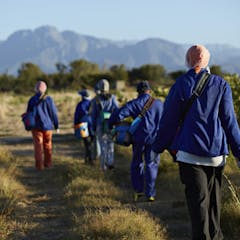
Articles on Food security
Displaying 1 - 20 of 467 articles

The most comprehensive assessment yet of a powerful greenhouse gas shows which countries are driving the increase, and which ones are successfully cutting emissions.

The University of Cape Town’s new report on the impacts of climate change in South Africa found that heatwaves and water stress will affect jobs, deepen inequality, and increase gender-based violence.

The big question: Would climate engineering like sending reflective particles into the stratosphere or brightening clouds help reduce the national security risks of climate change or make them worse?

Muslims internationally fast during the day in the holy month. But largely-Islamic nations are feeling the effects of climate change, making life harder both during and outside of Ramadan.

Approximately 22% of Malawians are food insecure, partly because of the poor maize harvest in 2023.

In the face of growing social and environmental challenges, organizations in the food and agriculture sector are increasingly turning to nature for inspiration.

New research shows how university garden initiatives can help drive transformative change and nurture a new generation of environmental and socially conscious change-makers.

Agricultural sustainability is as much about power and sovereignty as it is about soil, water and crops.

This key fertiliser ingredient is subject to sudden price spikes.

Integrating local and Indigenous knowledge into conservation can help to support diverse diets without compromising biodiversity goals.

Understanding how key dietary nutrients move around the world within traded food gives us a better picture of global population health – and how the wealth gap between countries affects it.

Ghana’s industries need fewer production constraints and more incentives to compete domestically.

Community-centred approaches to urban agriculture have been successful in various parts of the world.

Increasing the quality of a traditional wine sourced from plantain in Nigeria offers a viable way of reducing waste and boosting food security.

The early heat melted snow and warmed rivers, heating up the land and downstream ocean areas. The effects harmed salmon fisheries, melted sea ice and fueled widespread fires.

Food systems are increasingly disrupted by climate disasters, while also being a major contributor to climate change. World leaders at COP28 vowed to do something about it.

Two EU-funded projects are looking at high-tech solutions that could transform honeybee colonies into bio-hybrid entities.

Food insecurity is an issue felt particularly acutely by Inuit across Northern Canada. Culturally appropriate food systems may be the solution.

The share of low-income US families who sometimes or often didn’t have enough food to eat fell from 24.5% to 22.5% between late April and late July of 2020, a research team found.

Farming has made crop plants reliant on synthetic fertilisers, but we can reactivate their ability to engage with beneficial microorganisms and make them more independent.





